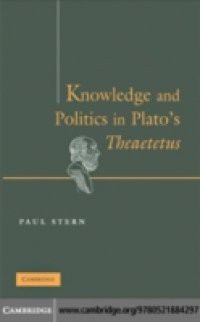The Theaetetus is one of the most widely studied of any of the Platonic dialogues because its dominant theme concerns the significant philosophical question, what is knowledge? In this book Paul Stern provides a full-length treatment of its political character in relationship to this dominant theme. He argues that this approach sheds significant light on the distinctiveness of the Socratic way of life, with respect to both its initial justification and its ultimate character. More specifically, he argues that Socrates' revolutionary decision to subject political life to philosophic reflection, the decision that leads directly to his trial and execution, is based on his awareness of the elusiveness of comprehensive knowledge and the implications of that elusiveness for the validity of philosophic inquiry. This view of Socrates' rationale has important consequences for our understanding of political philosophy and of the validity of the life of reason itself.

